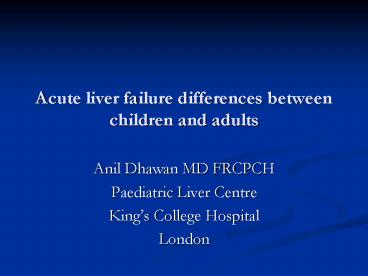Acute liver failure differences between children and adults - PowerPoint PPT Presentation
1 / 45
Title:
Acute liver failure differences between children and adults
Description:
Women whose most recent pregnancy ended in NNH ... CT scan (size and functional reserve) Japan. Serial USS (subjective, subacute liver failure) ... – PowerPoint PPT presentation
Number of Views:77
Avg rating:3.0/5.0
Title: Acute liver failure differences between children and adults
1
Acute liver failure differences between children
and adults
- Anil Dhawan MD FRCPCH
- Paediatric Liver Centre
- Kings College Hospital
- London
2
Are children small adults !
3
Acute liver failureChildren vs Adults
- Definition
- Aetiology
- Diagnostic difficulties
- Contraindications to Liver transplantation
- Prognostic criteria
4
Acute Liver Failure
Definition
Massive liver necrosis with encephalopathy
developing within 8 weeks from the first signs of
illness in a patient without underlying chronic
liver disease Troy and
Davidson
5
Acute liver failure
Encephalopathy
- late event
- difficult to diagnose in very young children and
particularly in infants
6
Complications
19
26
51
7
Acute liver failure
Definition
Multisystem disorder in which severe acute
impairment of liver function with or without
encephalopathy occurs in association with
hepatocellular necrosis in a patient with no
recognised underlying chronic liver disease
Bhaduri and Mieli-Vergani
8
Aetiology of ALF in adults
9
331 Pediatric Patients with ALF
APAP
Unknown
Drug
Hepatitis A
Viral (not B)
Shock
Autoimme Hep.
Wilsons
Metabolic
Other
PALFSG Data Set
10
Aetiology of ALF in childrenKCH datan236
11
Acute liver failure in childhood
Diagnostic Difficulties
12
Disorders not cured by transplantation
- Mitochondrial disorders with neurological
involvement - Niemann-Pick disease type C
- Giant-cell hepatitis with Coombs positive
haemolytic anaemia - Haemophagocytic lymphohistiocytosis
- Leukaemia - Lymphoma
13
Acute Liver FailureBone Marrow Exam
- Exclude-
- HLH
- Leukaemia
- Lymphoma
- Storage disorders
- Mitochondrial Disorders
14
HLH
15
Leukaemia
16
Nieman Pick Disease
17
Pearsons Syndrome
18
Value of liver biopsy
19
LT for neonatal hemachromatosis
20
Neonatal Haemochromatosis
Kings 1990 - 2002
Surgical management Liver transplantation
- 15 listed
- 10 transplanted
- (median age 18.5 days, range 5-42)
- 5 alive well
- (median follow up 3.6 years, range 0.5-7.6)
21
High dose immunoglobulin during pregnancy for
recurrent NNH WhitingtonHibbard Lancet 2004
- Methods-
- Women whose most recent pregnancy ended in NNH
- 1g/kg IVIG, weekly from 18th wk to end of
gestation - Results-
- 16 pregnancies, all live births, normal exam and
AGA - 12 babies evidence of NNH
- All survived with medical or no treatment
22
High dose immunoglobulin during pregnancy for
recurrent NNH WhitingtonHibbard Lancet 2004
- Conclusions-
- Treatment with IVIG modified recurrent
NNH (not lethal to fetus or neonate) - Support an alloimmune mechanism for recurrent
NNH - May be a preventable cause of ALF !
23
MITOCHONDRIA
24
PRESENTATION
- n 24
- Age at presentation
- 7.5 months (birth - 60 months)
- Mode of presentation
- acute liver failure (10/24)
- liver dysfunction (12/24)
- jaundice/organomegaly ( 2/24 )
25
Liver Transplantation for Mitochondrial
Cytopathies
- n3/24
- 1 death , 10 months post transplant
- 1 stable , 3 years post surgery
- 1 LT in infancy (her sib died), developed
myoclonic epilepsy, dg on muscle bx 14 y after
LT, well
26
Acute liver failure in childhood
When to list for transplant?
27
Prognosis -ALF
- KCH criteria
- Factor V (lt20 , age lt 30 yrs) French
- (Validated in UK not discriminatory in
Paracetamol OD) - Histological assessment of viable hepatocytes
(lt25 poor prognosis) - (sampling error)
- CT scan (size and functional reserve) Japan
- Serial USS (subjective, subacute liver failure)
- Serial AKBR (predicts likely survivors)
- (academic)
28
Patients Dhawan et al Ped Trans (2004)
- Retrospective review 1983 - 1994
- N 103
- 55 male
- Median age 3.13 years range 3 days 15.98 years
29
Outcome
- Alive n 24
- Dead n 43
- Transplanted n 36
30
Development of prognostic tool
- Univariate analysis, cross tabulation and ANOVA
- Multivariate logistic regression to develop a
predictive model - ROC curve to determine cut-off values
31
Haematological factors
32
Liver function test
33
ROC predictors of mortality for ALF
34
Prognostic indicators of outcome
35
ALF and Wilsons diseasePrognostic
Criterian57Died 15Alive without Tx
32 -Dhawan et al Liver Transplantation
2005 - highlight in Nature current Practice
2005
36
Wilsons Disease Outcome Score at Presentation
(Nazer et al, 1986)
PT converted to INR
37
Predictive Value of Mortality
LR
NPV
PPV
Specificity
Sensitivity
Score
4.2
97
56
78
93
³ 5
6.7
98
67
86
93
³ 6
8.7
96
72
90
87
³ 7
18.3
92
85
96
73
³ 8
33.3
91
91
98
67
³ 9
38
(No Transcript)
39
(No Transcript)
40
ROC predictors of mortality from Wilsons Disease
41
New Wilsons Index
Albumin (g/l)
WCC (109/l)
AST (IU/l)
INR
Bilirubin (mmol/l)
Score
gt45
0 6.7
0 - 100
0 1.29
0 - 100
0
34 44
6.8 8.3
101 150
1.3 1.6
101 150
1
25 33
8.4 10.3
151 200
1.7 1.9
151 200
2
21 24
10.4 15.3
201 300
2.0 2.4
201 300
3
0 20
gt 15.4
gt 301
gt 2.5
gt 301
4
42
Wilsons Index Predictive Value
43
(No Transcript)
44
Conclusions
- Encephalopathy not central to definition
- Different aetiology
- Diagnostic difficulties
- Prognostic criteria
45
Children are not small adults
5 days
5 years































